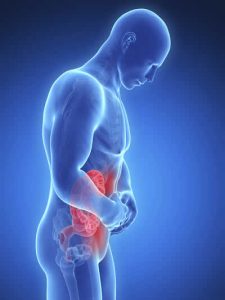Symptoms of irritable bowel syndrome
and diagnosis
The main symptoms of irritable bowel syndrome (spastic colitis) in patients are as follows:
- Reported episodes of abdominal pain
- Abdominal distension
- Abdominal pain episodes of abdominal pain (e.g., abdominal pain with emptying)
- Sensation of incomplete bowel movements and presence of mucus in the stool
- Constipation usually and more rarely diarrhea
90% of patients with Spastic Colitis experience at least three or more of these symptoms. Abdominal pain presents as colicky or constant or deep and is usually located in the lower and left side of the abdomen. It is most frequent after meals and as a rule does not wake the patient. The diarrhea consists of small volume stools and is rarely more than three per 24 hours. Constipation is also defined as one voiding over a period of more than three days, and the stools are hard in consistency and often small in diameter. Associated symptoms from the upper digestive tract, esophagus and stomach may be present less frequently. These include nausea, vomiting and a feeling of stomach fullness after eating a small amount of food.
Finally, sometimes there are symptoms not related to the digestive system, such as a feeling of easy fatigue, headache, backache, frequent urination, pain during sexual intercourse. For this reason, the diagnosis is not based on symptoms alone, but must be based on the exclusion of other organic diseases that present the same symptoms as Irritable Bowel Syndrome.
Thus, a detailed history, clinical examination, hematological and biochemical tests are considered essential tools for a correct diagnosis. Stool examination for the presence of blood, parasites or bacteria and colonic endoscopy complete the medical approach and substantiate the diagnosis by exclusion.
Read also:

